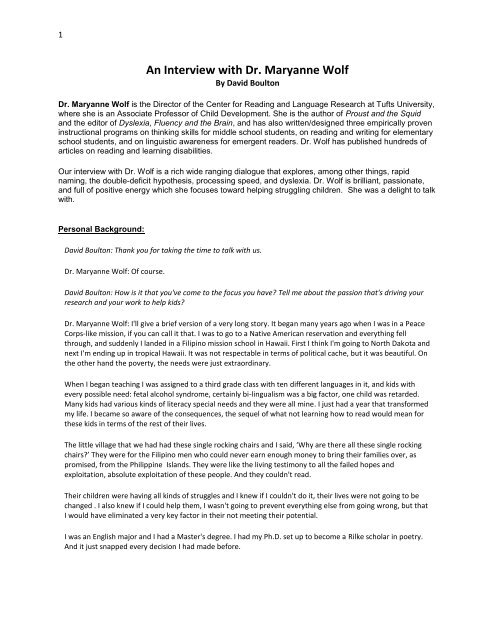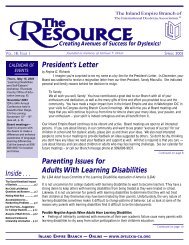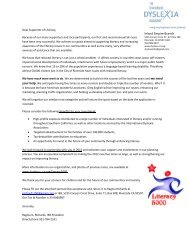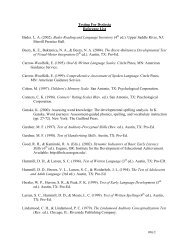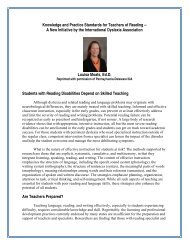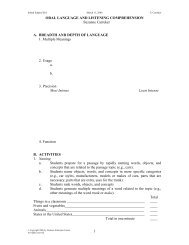An Interview with Dr Maryanne Wolf
An Interview with Dr. Maryanne Wolf
An Interview with Dr. Maryanne Wolf
Create successful ePaper yourself
Turn your PDF publications into a flip-book with our unique Google optimized e-Paper software.
1<br />
<strong>An</strong> <strong>Interview</strong> <strong>with</strong> <strong>Dr</strong>. <strong>Maryanne</strong> <strong>Wolf</strong><br />
By David Boulton<br />
<strong>Dr</strong>. <strong>Maryanne</strong> <strong>Wolf</strong> is the Director of the Center for Reading and Language Research at Tufts University,<br />
where she is an Associate Professor of Child Development. She is the author of Proust and the Squid<br />
and the editor of Dyslexia, Fluency and the Brain, and has also written/designed three empirically proven<br />
instructional programs on thinking skills for middle school students, on reading and writing for elementary<br />
school students, and on linguistic awareness for emergent readers. <strong>Dr</strong>. <strong>Wolf</strong> has published hundreds of<br />
articles on reading and learning disabilities.<br />
Our interview <strong>with</strong> <strong>Dr</strong>. <strong>Wolf</strong> is a rich wide ranging dialogue that explores, among other things, rapid<br />
naming, the double-deficit hypothesis, processing speed, and dyslexia. <strong>Dr</strong>. <strong>Wolf</strong> is brilliant, passionate,<br />
and full of positive energy which she focuses toward helping struggling children. She was a delight to talk<br />
<strong>with</strong>.<br />
Personal Background:<br />
David Boulton: Thank you for taking the time to talk <strong>with</strong> us.<br />
<strong>Dr</strong>. <strong>Maryanne</strong> <strong>Wolf</strong>: Of course.<br />
David Boulton: How is it that you've come to the focus you have? Tell me about the passion that's driving your<br />
research and your work to help kids?<br />
<strong>Dr</strong>. <strong>Maryanne</strong> <strong>Wolf</strong>: I'll give a brief version of a very long story. It began many years ago when I was in a Peace<br />
Corps-like mission, if you can call it that. I was to go to a Native American reservation and everything fell<br />
through, and suddenly I landed in a Filipino mission school in Hawaii. First I think I'm going to North Dakota and<br />
next I'm ending up in tropical Hawaii. It was not respectable in terms of political cache, but it was beautiful. On<br />
the other hand the poverty, the needs were just extraordinary.<br />
When I began teaching I was assigned to a third grade class <strong>with</strong> ten different languages in it, and kids <strong>with</strong><br />
every possible need: fetal alcohol syndrome, certainly bi-lingualism was a big factor, one child was retarded.<br />
Many kids had various kinds of literacy special needs and they were all mine. I just had a year that transformed<br />
my life. I became so aware of the consequences, the sequel of what not learning how to read would mean for<br />
these kids in terms of the rest of their lives.<br />
The little village that we had had these single rocking chairs and I said, ‘Why are there all these single rocking<br />
chairs?’ They were for the Filipino men who could never earn enough money to bring their families over, as<br />
promised, from the Philippine Islands. They were like the living testimony to all the failed hopes and<br />
exploitation, absolute exploitation of these people. <strong>An</strong>d they couldn't read.<br />
Their children were having all kinds of struggles and I knew if I couldn't do it, their lives were not going to be<br />
changed . I also knew if I could help them, I wasn't going to prevent everything else from going wrong, but that<br />
I would have eliminated a very key factor in their not meeting their potential.<br />
I was an English major and I had a Master's degree. I had my Ph.D. set up to become a Rilke scholar in poetry.<br />
<strong>An</strong>d it just snapped every decision I had made before.
2<br />
I came back to the mainland and almost immediately went into a program that prepared me to switch<br />
completely. The following year I went to Harvard to the reading laboratory and I just was determined from that<br />
moment on that I was going to use my life to help kids through learning how to read. That was my vehicle to<br />
ensure that they're going to at least have a shot at their potential. That that [reading failure] was not going to<br />
hold them back.<br />
That experience at Harvard's reading lab introduced me to all kinds of different approaches to the problem. I<br />
had been thinking about it, more or less, from almost a sociological viewpoint. When I got to Harvard it was a<br />
surprise to me. Here I am an English major and I became a scientist. I became totally involved in neuroscience<br />
because it really seemed to me that we were going to get answers the likes of which we had never had before<br />
in education from understanding what is going on in the reading brain. So, that became my quest, if you will, to<br />
understand what it is the brain does when we read and how we can translate that knowledge, that<br />
fundamental, theoretical knowledge into very practical applications in terms of diagnosis, assessment, and<br />
most important to me, intervention.<br />
So, twenty-plus years later I now have become very involved in the design and creation and testing through the<br />
National Institute of Child Health and Human Development (NICHD)of the best forms of intervention for<br />
different kinds of children <strong>with</strong> their different kinds of reading issues. It’s been a long journey and it’s been a<br />
theoretically exciting one. I have to say, intellectually, I have never ever had one day of boredom. It’s made my<br />
life very satisfied, if you will, in terms of feeling like everything I do and learn has something that makes the<br />
lives of some kids better. It feels like a great way to live a life. So, that's my story.<br />
David Boulton: That’s a great story. Thank you for sharing it. I like how you connected the dots. Maybe it's not<br />
surprising to you, but a lot of the people I talk <strong>with</strong> have had some experience in their life that brought home<br />
the incredible importance of this in a way that highlights the social lack of understanding at the core of it.<br />
<strong>Dr</strong>. <strong>Maryanne</strong> <strong>Wolf</strong>: Yeah. Well, mine began actually in the social political realm and then it just didn't let go of<br />
me. At that moment I so wanted to study poetry. Instead, I became a scholar who knows what happens when a<br />
poet retrieves a word. It's still intellectually a lot of fun but it is very different from where I began.<br />
History of Reading Disabilities and Dyslexia:<br />
David Boulton: So, what would you say are the most important findings or the most important things that have<br />
come out of your research into the neuroscience of reading that are not generally well understood?<br />
<strong>Dr</strong>. <strong>Maryanne</strong> <strong>Wolf</strong>: The history of reading disabilities, (I'll use the word dyslexia - some people use it, some<br />
people don't), is such a fascinating one because it's like a case study in science patterns, the desire for<br />
parsimony among scientists and the refusal of the human brain to be typed in one way. What you see in this<br />
history is one researcher after another seizing on what is in front of them and saying, "Ah, that's what dyslexia<br />
is. That's what causes it." <strong>An</strong>d it's really the most over-worked and even platitudinous analogy in the world. But<br />
the blind men and the elephant describe the history of dyslexia research. The Blind Men and the Elephant: In<br />
various versions of the tale, a group of blind men (or men in the dark) touch an elephant to learn what it is like.<br />
Each one feels a different part, but only one part, such as the side or the tusk. They then compare notes and<br />
learn that they are in complete disagreement.<br />
David Boulton: <strong>An</strong>d the Sufi key Story.<br />
<strong>Dr</strong>. <strong>Maryanne</strong> <strong>Wolf</strong>: Exactly. If you look and put together even only the names of dyslexia, you'll see one<br />
hypothesis is visual, one is memory, one is verbal, one is auditory. You just go down the list. Well, if you put<br />
them all together, or if, as I'm doing this in a book now, I just put those names on the brain and you see a crude<br />
cartography of reading. In other words, if it can go wrong it does. <strong>An</strong>d at one point in the history of dyslexia
3<br />
each has been called the major explanation for dyslexia. Now, the modern history has been punctuated by<br />
really different, very technologically sophisticated approaches including neurosciences and also including a lot<br />
of wonderful work done in an area called psycholinguistics.<br />
In the 1970’s there was a great set of researchers at Haskins Lab at Yale and they were really beginning a whole<br />
new approach to understanding dyslexia by looking at the linguistic foundations of reading breakdown. That<br />
began one of the single best hypotheses we've ever had which is that the phonological system in language, that<br />
is, our ability to hear, to discriminate the smallest sounds called phonemes in words is a fundamental necessity<br />
in learning to read and a fundamental source of why some children can't learn to read. That began what is<br />
called the phonological deficit hypothesis, which has really been the most successful of explanations to date.<br />
Rapid Naming, Phonemic Awareness and Speed of Processing:<br />
<strong>Dr</strong>. <strong>Maryanne</strong> <strong>Wolf</strong>: My research began while that hypothesis was in its zenith. At the same time I was equally<br />
influenced by neurosciences, which was then called neurological or neuropsychological studies. We were<br />
beginning to see that there was this one very odd phenomenon that children who were going to become<br />
dyslexic were always exhibiting, whether they were five or six or seven, and that was a failure to be able to<br />
name, it’s so simple, to name things they saw at the same speed that other children could.<br />
Well, naming seems very simple but it's actually a very difficult set of underlying processes. So, my mentor,<br />
Martha Denckla and her mentor, a neurologist, Norman Geschwind, were responsible for really getting the<br />
field to think differently, if you will. In the beginning, people said, "Well, naming speed is just another kind of<br />
phonology. You need to be able to retrieve a phonological label." <strong>An</strong>d, for a while that satisfied me. Then, I<br />
began to see kids who had no phoneme issues in other areas and yet they had this....
4<br />
David Boulton: You mean in terms of their ability to articulate themselves on the fly they would demonstrate<br />
that they had good phoneme processing but they couldn't name, which has an association component?<br />
<strong>Dr</strong>. <strong>Maryanne</strong> <strong>Wolf</strong>: Well, that's really close. I'll just give you a slightly more technical explanation by saying<br />
that when we did all our tests we had explicit measures of these phoneme awareness skills that everybody says<br />
were the most important ones and we were seeing that some kids didn't have that but they had naming speed<br />
issues. Well, if they're both the same, they should have both. <strong>An</strong>d they weren't exhibiting that and that began<br />
us thinking that there are so many issues beyond the phoneme, which includes the visual system and the<br />
retrieval system. It includes the speed <strong>with</strong> which the brain puts its systems together.<br />
That was what we got fixated on. That's not the same as phoneme awareness. So, we then began to really get<br />
in-depth understandings of naming speed and the speed <strong>with</strong> which not only that you name but the speed <strong>with</strong><br />
which you read and how that fluency in reading is really important not for speed as speed, but for the brain's<br />
ability to do those easy processes fast enough to allocate time to comprehension.<br />
David Boulton: Right. So, those lower levels are operating efficiently and there's sufficient bandwidth to be<br />
reflective and comprehensive.<br />
<strong>Dr</strong>. <strong>Maryanne</strong> <strong>Wolf</strong>: Perfect. That's what we were beginning to understand. So, this tiny little innocuous naming<br />
speed test opened up a world of understanding about how important all of these individual processes are that<br />
go beyond the phoneme and how important reading fluency is for comprehension. So, that puts you into,<br />
literally, a different ball park from the implication of the phonological deficit, which is that you work on words<br />
and phonemes and you get the kids to be able to recognize words and read, decode them and everything else<br />
is going to happen naturally. Well, it isn't that simple.<br />
Double-Deficit Hypothesis and Interventions:<br />
<strong>Dr</strong>. <strong>Maryanne</strong> <strong>Wolf</strong>: My colleague, Pat Bowers, and I, and others, (we weren't the only two), advanced our<br />
hypothesis in the early nineties. Back then we were kind of John the Baptist-types. It was a little hard going<br />
there for a while. Then people started thinking, we know they're right. We still believe it's phonology but there<br />
is no doubt that there are these kids. Here is where what we call the double-deficit hypothesis comes in: there<br />
are these kids who have single deficits in phoneme awareness, single deficits in naming speed <strong>with</strong>out<br />
phoneme, and then double-deficit kids who have both. The kids who have both reading fluency and<br />
comprehension issues have different reasons for reading failure than the kids who have only phoneme<br />
awareness issues.<br />
David Boulton: <strong>An</strong>d therefore, need different interventions to differentiate their way through what’s obstructing<br />
their processing.<br />
<strong>Dr</strong>. <strong>Maryanne</strong> <strong>Wolf</strong>: Perfect. That was the whole point. If you believe that everything is phonology then there’s<br />
only one intervention needed, if you believe that there could be different reasons for this naming speed then<br />
you have to really make sure your intervention is going after all those different things and putting it in the<br />
intervention plans.<br />
So, my work in the mid-nineties was funded by Reid Lyon's group at NICHD. They were funding us to begin to<br />
design whole new interventions based on our knowledge of both the reading brain and our knowledge of<br />
linguistics; all the things that go into what we do when we try to retrieve words in time, both at the phoneme<br />
level, the word level, and the whole connected-text level.<br />
We began an intervention called RAVE-O, which really emphasizes all that we knew and our evolving<br />
knowledge about how the brain processes words. We've got now considerable data that support us showing
5<br />
that the kids who have these naming speed and fluency issues are very much better served by this RAVE-O<br />
fluency program. <strong>An</strong>d the kids who have only a phonology issue are well-served by only phonology-oriented<br />
programs. So, our data is showing both the efficacy of our work and also the needs that these other kids have<br />
that go beyond the conventional phonological programs.<br />
Orthographic Representation: [Orthographic – related to the study of spelling]<br />
David Boulton: Excellent. Let's go into rapid naming for a moment.<br />
<strong>Dr</strong>. <strong>Maryanne</strong> <strong>Wolf</strong>: Sure.<br />
David Boulton: Most children seem to be able to name the things that are around their world relatively easy<br />
compared to the challenge of reading.<br />
<strong>Dr</strong>. <strong>Maryanne</strong> <strong>Wolf</strong>: Yes, definitely.<br />
David Boulton: All right. But there's a difference in reading that comes from the need to be able to name or to<br />
deal <strong>with</strong> letters and their letter sounds and stick them together fast.<br />
<strong>Dr</strong>. <strong>Maryanne</strong> <strong>Wolf</strong>: That's right.<br />
David Boulton: To bundle them together in…<br />
<strong>Dr</strong>. <strong>Maryanne</strong> <strong>Wolf</strong>: To put all of that together.<br />
David Boulton: Right.<br />
<strong>Dr</strong>. Maryann <strong>Wolf</strong>: You're quite correct. There's something called orthographic representation. We know a lot<br />
about phoneme representation but we don't know as much about what we're doing when we rapidly make<br />
patterns of letters that are specific to our language versus another. For example, in German you would see s-ch-r<br />
very frequently. In English, you would never see it. The German child makes an orthographic<br />
representation, has a pattern...<br />
David Boulton: As a structural unit.<br />
<strong>Dr</strong>. <strong>Maryanne</strong> <strong>Wolf</strong>: Yes, as a unit. Some children <strong>with</strong> reading problems don't have that unit. In English you<br />
have units that are specific to our language. Part of RAVE-O is teaching those units explicitly and trying to make<br />
them faster and faster.<br />
David Boulton: So, you're trying to make sub-unit visual recognition happen fast.<br />
<strong>Dr</strong>. <strong>Maryanne</strong> <strong>Wolf</strong>: Perfect. So, one piece of RAVE-O is devoted to making orthographic chunks automatic in<br />
the kids. <strong>An</strong>other piece is devoted to the experience of entertaining different meanings of a word. A lot of our<br />
kids are almost penalized because not only are they slower at putting those letters together, they're slower at<br />
retrieving the meanings. So, a lot of them only have one meaning and they’re missing the point or missing the<br />
joke or missing the poem because they don't have that rapid retrieval of multiple meanings. Nor did their<br />
system in the beginning allow them to.<br />
David Boulton: Are you connecting that to the overall ecology of processing and bandwidth again?
6<br />
<strong>Dr</strong>. Maryann <strong>Wolf</strong>: Well, it is very similar. At the same time we're teaching orthographic patterns, we're<br />
teaching them the search for multiple meanings of words. We're teaching them how words can be used<br />
differently in syntax by adding on morphemes that are in patterns, -ed, -ing, -s, -ly, or pre-fixes: pre-, re-, all of<br />
those things. We want them to see them, but we also want them to know how they change the meaning. So,<br />
it's all in there.<br />
Processing Bottleneck Relative to Rapid Naming Difficulties:<br />
David Boulton: Back to rapid naming for a moment. Have you found where you think the processing bottleneck<br />
is relative to difficulties <strong>with</strong> rapid naming?<br />
<strong>Dr</strong>. <strong>Maryanne</strong> <strong>Wolf</strong>: Great question. I wish. I really wish. We have a lot of very high-falutin’ experiments. Some<br />
of them are literally speech-synthesis experiments where we computerize the speech stream and we look at<br />
exactly where the differences are. Is it in, like the visual, if you remember those rapid naming tests, there's five<br />
lines of ten symbols, like ten letters...<br />
David Boulton: Yes.<br />
<strong>Dr</strong>. <strong>Maryanne</strong> <strong>Wolf</strong>: Each of those letters are repeated two times on a line and there's only five letters being<br />
repeated ten times in a group of fifty letters, so it's not like a big deal of knowledge. But at the end of a line if<br />
the visual system is slow you're going to be able to detect it in the amount of time that a student takes from<br />
one line to the next. That would be one logical hypothesis. <strong>An</strong>other is articulation. So, we would measure<br />
articulation. There are all these different hypotheses.<br />
David Boulton: Right. You could use Keith Rayner's work to differentiate what part is visual from what part is<br />
stuttering up in the articulatory circuitry.<br />
<strong>Dr</strong>. <strong>Maryanne</strong> <strong>Wolf</strong>: Right. We're trying to eliminate where we can, and in fact, we are not seeing gross visual<br />
differences at the end of the line. We think that there are some differences in some kids, but not all kids. But<br />
what we do see is that the bottleneck is the time in between the articulation of one symbol and the beginning<br />
of the processing of the other. So, everything that's in that gap, not the visual line, not articulation, but<br />
everything that's in that gap...<br />
David Boulton: Kind of recovery and reset from articulation.<br />
<strong>Dr</strong>. <strong>Maryanne</strong> <strong>Wolf</strong>: Yes, all that that comes before and after disinhibition from the previous stimulus setting it<br />
up. Here's where visual processes can come in, but also hooking it up then to the phonological label. All those<br />
kinds of processes that go into access and retrieval and perception, those are in there. The time and the speech<br />
stream research shows us that's where your money is. But that includes many different areas, so then you have<br />
to go into each one of those. <strong>An</strong>d here's where the field is, rightly, reluctant to get that complex. We aren't<br />
reluctant. We are going to pursue it until we feel like we know which child has which area of problem but in<br />
fact it means that you have to have a pretty sophisticated set of tests to be able to say, "Well, this child has all<br />
of those areas slower." Or, "This child has only one area that's slower."<br />
So, what you have, if you will, it's like we've narrowed it down to a set of processes. We've eliminated some<br />
things like articulation and gross eye movement. But in that subset we still don't know which child has which or<br />
whether they have all of the above. That's where I think the field is right now.<br />
Dyslexia and Environmental Influences:
7<br />
David Boulton: Excellent. Let's climb back up for a minute. You used <strong>with</strong> some hesitancy <strong>with</strong> the word<br />
'dyslexia'.<br />
<strong>Dr</strong>. Maryann <strong>Wolf</strong>: I use it always. But I think the world sometimes has more difficulty. Not my world, but I'm<br />
thinking this is more for the public.<br />
David Boulton: Yes, it’s such an over-generalized term. I mean, it's a term that's like the Holy Grail, pick your<br />
definition and apply it.<br />
<strong>Dr</strong>. <strong>Maryanne</strong> <strong>Wolf</strong>: Yeah.<br />
David Boulton: You also use the term developmental dyslexia. What do we know about neurobiologically innate<br />
dyslexia versus dyslexia that is a consequence of the learning environment that children are growing in?<br />
<strong>Dr</strong>. <strong>Maryanne</strong> <strong>Wolf</strong>: Well, that's one of the interesting things about naming speed. I have to say, by and large,<br />
that our kids who have a lot of environmental issues, they do not have differences on naming speed on things<br />
like color or numbers, as long as they know their numbers and colors. That's not the case for all kids. There<br />
really are extraordinary differences when you walk into kindergarten. But let's say in second grade you find the<br />
kids who have some of the phoneme awareness issues that can certainly go <strong>with</strong> environmental causes, but<br />
naming speed seems more hardwired. You've got some real issues that you're picking up here that are there<br />
forever. In the most compensated dyslexic adult that we've studied you still see these differences. <strong>An</strong>d these<br />
are some Nobel Prize winners.<br />
David Boulton: Are you familiar <strong>with</strong> Hart and Risley's research?<br />
<strong>Dr</strong>. <strong>Maryanne</strong> <strong>Wolf</strong>: Oh, gosh. There's the Hart-Risley studies on the thirty million word gap. There's no<br />
question that makes such a huge difference.<br />
David Boulton: I would think that the other side of that is that the greater the number of articulations the<br />
children make, the better - the more that you do it, the faster you get at it.<br />
<strong>Dr</strong>. <strong>Maryanne</strong> <strong>Wolf</strong>: Yes. In kindergarten I think you still have that, but let's say the child's been in the system<br />
for two years. At the level of naming a color or number you really are getting much closer, no matter what your<br />
environmental input is, unless it's just disaster. So, we have this suspicion based on data that if you look at<br />
what we, I just hate this word, but the field historically has used terms like garden-variety poor reader or nondiscrepant<br />
poor reader to describe children whose environment and intellectual quotient on an intelligence<br />
test or something like that is commensurate <strong>with</strong> their reading. Well, I don't like those terms. But let's just say<br />
environmental reasons for lack of a better word. Those kids on our tests look like every other kid on naming<br />
speed in grade two. In grade one, grade kindergarten, they're a little down but they're really getting as close as<br />
can be by grade two, even grade one. But the kids among them who are environmental and dyslexic, in my<br />
terms, their naming speed is going to be depressed down through eighth grade, and now we know into<br />
adulthood. It is a fundamental difference.<br />
Percentage of Population <strong>with</strong> Innate Dyslexia:<br />
David Boulton: Okay. Can you tell us what percentage of the population has innate dyslexia?<br />
<strong>Dr</strong>. <strong>Maryanne</strong> <strong>Wolf</strong>: Sure.
8<br />
David Boulton: <strong>An</strong> overlay if possible. We've got a consensus between Reid Lyon, James Wendorf and Sally<br />
Shaywitz, and others that seem to say that we're talking about five or six percent that have some kind of innate<br />
or neurobiological, structural level difficulty. <strong>An</strong>d that for the larger population of struggling readers, the<br />
primary difference for them is the learning environments they’ve been in and the kind of instruction they're<br />
receiving.<br />
<strong>Dr</strong>. <strong>Maryanne</strong> <strong>Wolf</strong>: You mean the balance of the percentages that people have would be more environmental.<br />
Is that what you mean?<br />
David Boulton: I mean, Reid Lyon's says ninety-five percent of the kids that have trouble <strong>with</strong> reading are<br />
instructional casualties.<br />
<strong>Dr</strong>. <strong>Maryanne</strong> <strong>Wolf</strong>: Well, I really respect Reid so much. It’s just that sometimes he may exaggerate. Let's just<br />
say that. <strong>An</strong>d I love his exaggerations because they always help us and sometimes they help us by having to<br />
clarify things he’s said.<br />
David Boulton: Or James Wendorf, to whatever degree he's independent, says that the National Center for<br />
Learning Disabilities research on the amount of innate neuro-biological learning disabilities happens to be at<br />
the same number.<br />
<strong>Dr</strong>. <strong>Maryanne</strong> <strong>Wolf</strong>: Yes, well, I think that most people would say between five and ten percent. Closer to five,<br />
but between five and ten percent of a given population would have some kind of neuro-biological foundation<br />
for the dyslexia. We know increasingly about the genetic components. We're not there yet, but there's such<br />
rich genetic knowledge going on. I think in any given place you've really got a lot of different factors going on<br />
and environmental is a big word that I would prefer to parse.<br />
David Boulton: Yes, I agree. I totally agree.<br />
Bilingual, ELL and African American Vernacular English Learners:<br />
<strong>Dr</strong>. <strong>Maryanne</strong> <strong>Wolf</strong>: So, the parsing that I would do includes what are the children who are bi-lingual or Englishlanguage<br />
learners? What effect does that have? This is an issue that a social linguist colleague and I are working<br />
on, his name is Chip Gidney. He’s here at Tufts and is working on African American children who speak African<br />
American Vernacular English. You know we have Standard English as a dialect and Vernacular English as<br />
another dialect. Well, what are some of the issues that you have when the two dialects are so close and yet<br />
you are learning to read in one of those?<br />
David Boulton: Which has vocabulary and nuances that are quite different.<br />
<strong>Dr</strong>. <strong>Maryanne</strong> <strong>Wolf</strong>: Yes, but also the phoneme level. So, we're really looking at some of the phonological<br />
difficulties of some of the kids who speak African American Vernacular English and we're hoping like heck that<br />
some of that research will point the way to understanding what's going on <strong>with</strong> that particular percentage.<br />
Then you have your children of poverty who, like your Todd Risley study, have not had the same deck of cards<br />
that the other kids have. They're walking into kindergarten totally different linguistically.<br />
David Boulton: Well, my understanding of Risley’s work was that it really came down to the amount of talking<br />
going on.<br />
<strong>Dr</strong>. <strong>Maryanne</strong> <strong>Wolf</strong>: That's right.
9<br />
David Boulton: <strong>An</strong>d that it didn't matter whether it was somebody that was rich and taciturn or poor and<br />
talkative, that the language exposure had two influences. One, in the field of linguistic exercise, developing<br />
vocabulary, developing processing speed, developing phonemic awareness differentiation, all that...<br />
<strong>Dr</strong>. <strong>Maryanne</strong> <strong>Wolf</strong>: Yep.<br />
David Boulton: <strong>An</strong>d at the same time that the greater number of words tended to be of a more positive affect.<br />
<strong>Dr</strong>. <strong>Maryanne</strong> <strong>Wolf</strong>: It's amazing what all that work means. <strong>An</strong>d Catherine Snow and David Dickinson and<br />
others also have shown that dinner talk is important. How we talk, how much we speak, what do we do <strong>with</strong><br />
our language around children? This is so important for our pre-school teachers to know. I had one wonderful<br />
dissertation on that and there are so many things that we should be doing that we can do easily but that are<br />
not happening and that's one of them: the development of language in our children.<br />
I think the pediatricians can play a role here, too. My hope has always been, and some people are doing this,<br />
that when you have your well visits you also have a little set of books or other things that the mother or father<br />
or caretaker can take home and use <strong>with</strong> their children at each juncture of each year, those first five years. So,<br />
that's a really important potential asset for our society that we don't use enough.<br />
David Boulton: Right. There's a lot of different programs that are moving in that direction.<br />
<strong>Dr</strong>. <strong>Maryanne</strong> <strong>Wolf</strong>: Yes, and that's great. Everything we can do.


